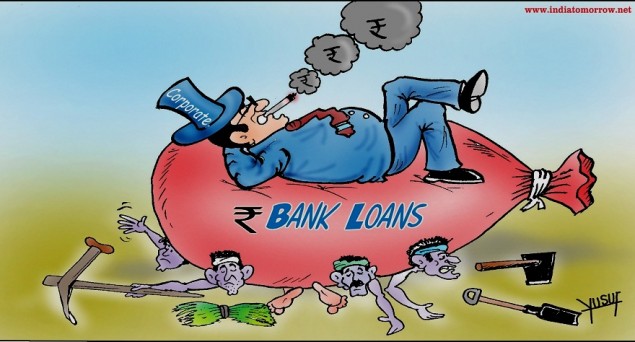Ghazanfar Abbas, IndiaTomorrow.net,
New Delhi, Oct 5: The Communist Party of India (Marxist) on Tuesday urged Prime Minister Narendra Modi to make public the names of top 100 loan defaulters with the due amount publicly, and fend off the idea about setting up a ‘bad bank’ for loan defaulters.
“The need of the hour is for your government to put into practice an urgent plan to start recovery of pending loans from top 100 borrowers. You must begin by making public their names with the due amount. A failure to do so would mean that your government is making our working people pay for the criminality of the rich defaulters,” CPI-M General Secretary Sitaram Yechury said in a letter to PM on Tuesday.
Citing the alarming increase in the non-performing assets (NPA) of state-owned banks, he said that bad loan provisioning for most state-owned banks had doubled, and even trebled, in some cases in 2015-16.
“To make matters worse, the core earnings of most of these banks have fallen grossly short of the requirement for bad loan provisioning. There has been a lack of concerted effort to recover these bad loans, and your government has instead waived ₹59,547 crore of bad loans of big borrowers in 2015-16,” said Yechury in the letter.
Opposing the idea of a ‘bad bank’ he wrote: “We have seen a proposal to divert all the bad loans from state-owned banks by creating a single ‘bad bank’. It is an attempt to portray a clean-up of bank account books by diverting the bad loans to a separate new entity, which will still be government owned.”
Concept of ‘Bad Bank’
In a pre-budget meeting held in January this year, the finance ministry proposed an idea to set up a Bad Bank to absorb all non-performing assets (NPAs) of public sector lenders citing that loans that do not yield returns should be segregated and transferred into a new “bank”, so the lenders can resume normal business functioning and start lending again instead of focusing on management of bad assets.
Follow the principle of “Recovery First, Recapitalize Later”: Yechury
Through this letter Sitaram Yechury not just opposed the idea to create a “bad bank” but also advised the central government to follow the principle of “Recovery First, Recapitalize Later”, so it may not lead to an overburden to the honest tax payers belong to a majority of the middle classes; and the poor of the country.
Stressing on the recovery of loans from big borrowers he said in the letter, “These big borrowers have viable assets which can be easily recovered by banks, if backed by political will and determination.”
Yechury said the proposed “bad bank” will still be furnished by public money as all the other banks will be recapitalized by the government, while big borrowers would be allowed to go scot-free at the cost of the honest tax-payer.
“Before any attempts at whitewashing the bad loans by recapitalizing the banks, the principle of ‘Recovery First, Recapitalize Later’ must be followed in letter and spirit of your government. To not do so would confirm our worst fears of your government — which has written off Rs 1,12,089 crore of loans of big borrowers — being beholden to crony capitalism,” Yechury emphasized.
Yechury also pointed out that the idea to create a “bad bank” was rejected by former RBI Governor Raghuram Rajan.
In September last year, while delivering the CK Prahlad memorial lecture in Mumbai, Rajan had said, “The concept of a good bank and bad bank may not be relevant for India since much of the assets backing the banks’ loans are viable or can be made viable.”
In his first letter written on July 7th this year, Yechury had cautioned the Centre against recapitalization plans of public sector banks.
Comment from RBI Governor Urjit Patel
In his first media briefing as Governor of RBI, Urjit Patel on Tuesday said: “The NPA situation is an important issue for the RBI. We will be dealing with the situation with firmness but also with pragmatism so that the economy does not any lack of credit.”





